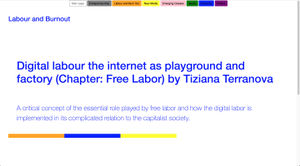User:Rita Graca/specialissue
Events
Life Hacks: Space
Life Hacks: Time
Special Issue Launch
Life Hacks: Mind
Silvio's classes
WdKA tour (w/ Bo)
http://pzwiki.wdka.nl/mediadesign/Bo_%26_Rita
Suggestions and presentation (w/ Bo and Pedro)
Entreprecariat Reader
(w/ Biyi, Tancredi, Bo)
All files in git
This website is an interactive archive for the Entreprecariat Reader. In this reader, we selected and archived eight pieces of texts that reflect the topic of Entreprecarism.
Based on the content of each text we have created seven categories that you can choose to order texts according to your interests.
These categories are: Entrepreneurship, Economy, Emerging Classes, Labour and Burnout, New Media, Politics and Space.
Notes
The idea of the Entreprecariat has been popularised following the 2008 crisis.
Gig Economy — Corporations set up their business model in such a way that they have a minimum number of formal employees, while ‘engaging services’ from a large pool of casualized, self-employed people.
According to the New York Times Crossword Puzzle, "the precariat is the class of people whose lives are precarious because they have little or no job security".
“Worker rights in online labour platforms should be of interest for anyone concerned with the present and future of democracy”
Why do companies want to make contracts where they state the person is “self-employed”? The benefits are that they don’t owe them anything. It ensures they have no employment rights of any kind.
What is the breach in the law that allows them to not pay the minimum wage to their workers? Is the “self-employed” title?
With most platforms classifying their workers as independent contractors, the platforms have freed themselves from the responsibilities that employers have in complying with labour rights, including basic protections such as paying the minimum wage, respecting limitations on working hours, providing paid sick leave, making social security contributions, and permitting collective bargaining. And in the process, working conditions and earnings have suffered.
“A new precarious class has superseded the old working class: the service precariat of the 21st century, the analogue of the industrial proletariat of the 20th century; the precarious are organizing in the workplace, in the streets, and on the net, developing a distinctively anarcho-populist ideology and an eco-queer culture.”
An insecure class. Its growth has been accelerated by the neoliberalism of globalisation, which put faith in labour market flexibility, the commodification of everything and the restructuring of social protection.
Pads
https://pad.xpub.nl/p/burnout-02.10.18
https://pad.xpub.nl/p/burnout-18.09.18






